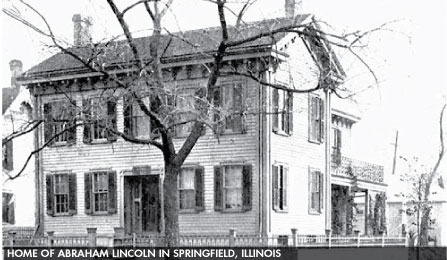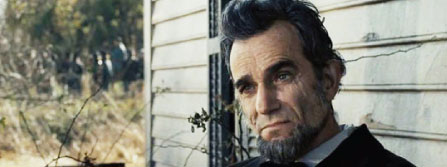
DORIS KEARNS GOODWIN
LOVES THE MOVIES
|
Doris Kearns Goodwin is one happy historian. “Team of Rivals: The Political Genius of Abraham Lincoln,” her prize-winning, best-selling account of the Lincoln White House, has been turned in part into a film by Steven Spielberg with a script by Pulitzer Prize winning playwright Tony Kushner (“Angels in America”) starring Academy Award® winner Danie Day-Lewis (MY LEFT FOOT, THERE WILL BE BLOOD). LINCOLN will have its World Premiere at the American Film Institute’s AFI FEST in Hollywood on November 8. Goodwin saw the nearly finished film in August. “I think it’s quite wonderful,” she said. We spoke to her about LINCOLN and movies in general on a day when her press commitments were beginning to pile up and her voice was getting raspy from a surfeit of air travel. The author was the same genial personality we’ve come to know from her many television appearances. It turns out she is a “huge movie fan.”
“We have…a big screen television that comes down to watch movies on with friends, but there’s still something special about going to the movie theater, letting the lights darken, having the M&M’s® and sitting there and watching movies,” she explained. “We live in Concord, Massachusetts, so we’ve got a theater in Lowell that has stadium seating, about 15-20 minutes away, a theater in Burlington, and then sometimes we need to go to Boston or Cambridge to watch.” Goodwin’s favorite movie memory is GONE WITH THE WIND, “having read it at 12-years-old with my best friends on a blanket on our lawn and then finally seeing the movie when the book had meant so much,” she recalled. “I’ve loved all those old historical ones. I loved THE KING’S SPEECH last year and I loved THE ARTIST and sometimes I love just plain comedies like THE KIDS ARE ALL RIGHT. I like mysteries, but there aren’t that many mysteries. You know, they’re different from spy films. I like James Bond. I just love the experience of going to the movies.” Amazingly, Goodwin isn’t the only author in her family with a major movie book deal. Her husband Richard Goodwin, who worked in the Kennedy and Johnson administrations, wrote a memoir called “Remembering America,” which included his role in investigating television quiz shows in the 1950s. That chapter formed the basis of Robert Redford’s acclaimed 1994 film QUIZ SHOW, which was nominated for an Academy Award® for Best Picture. Goodwin’s relationship with Spielberg dates back to the 1990s. “He was making a film for the millennium, a documentary about the history of the 20th Century that was going to be shown at the Lincoln Memorial,” she recalled. “We had a meeting of historians in New York and then I followed up with some notes for him and he invited me to come out to his home on Long Island to talk about the documentary more.” While she was there, the director asked Goodwin what she was working on. When she explained she was in the middle of a book about Lincoln, he confessed that he had always wanted to make a movie about him and asked to have a first look at it. They shook on it. “And I thought, wow, that would be great and I wasn’t even done yet at that time,” said Goodwin. Spielberg and Goodwin talked several more times about the project and the author sent him some of her early chapters. Spielberg optioned the book before Goodwin finished it. “He brought Tony Kushner on board and then we had a big meeting in New York,” the author remembered. “Again, I put together some of my fellow historians – just a whole day’s meeting about Lincoln – and that’s the day that Tony Kushner decided definitely that he would write the script, after saying that it had seemed like a daunting project. I was teasing him that everybody who’s lived with Lincoln is glad they did so because he’s so companionable.
Goodwin and Kushner became friends and the historian was shown several different drafts of the screenplay. “We talked a lot about it,” Goodwin recalled. “Finally, the script got done and Daniel Day-Lewis agreed to play Lincoln. I went with Daniel to Springfield, to show him some of the Lincoln sites…and had a wonderful couple of days with him; showing him Mary Lincoln’s home, where she and Abe lived; and the law office where he had worked. I took him through the Lincoln Museum, because I have friends there, obviously, that I’ve gotten to know over the years. It was just a great experience to see him absorbing it so much.” Is Day-Lewis the Lincoln the author imagined when she was writing “Team of Rivals”? “I can’t imagine anybody better,” she replied. “There’s something about his intensity, the humor that does light up his face when he smiles, his intelligence and his person…he’s a very profound person…a big reader of history; he knows history, so he was the perfect choice, I think.” |
When shooting began in Richmond, Virginia, Goodwin visited the set. “They were filming part of the congressional debate over the 13th amendment [outlawing slavery], so they were using what was the statehouse in Virginia as if it were the Congress. And it’s such a beautiful building…designed by Thomas Jefferson, I believe. I saw some of those arguments going on and it’s great…very much like you imagine arguments in Parliament, people really yelling at each other and confronting each other and very exciting, as it was.”
Goodwin also visited the White House set that had been reconstructed in an old pinball factory. “The production designer Rick Carter is a genius,” she said. “I kept imagining: what was Lincoln’s office like, what was the White House like during his time and they had recreated it with such attention to detail that I really felt that I had been thrown back into the 1860s.” Goodwin feels that way about the movie as a whole. “You feel like you’re really watching Lincoln. I spent 10 years, hopefully bringing him alive to readers, and nothing would matter more to me as an historian than to have this great figure come alive to millions more through the big screen. They’ve done a pretty terrific job.” Does Goodwin see a trace of Lincoln in today’s presidential candidates? “I think both parties would love to believe that they’ve inherited Lincoln’s character and his philosophy and his leadership skills,” she said. “I know that Obama certainly has read a lot about Lincoln and thought about Lincoln. I know the Republican Party is very proud of having had the forerunner of their party in Abraham Lincoln. But I think when Abraham Lincoln came on the scene, before he was iconic, no one would have imagined that he was going to become Abraham Lincoln and he was greeted as a fourth-rate lecturer. He told somewhat dirty, humorous stories, and they thought he didn’t even have good grammar and here he becomes Abraham Lincoln! So it’s hard to judge somebody without that distance of time.” We asked Goodwin whether future historians would take movies into account. “That’s a great question,” she exclaimed. “What’s going to happen for historians 200 years from now compared to what I was able to have, looking back to the 1850s and ‘40s? The treasure for historians now looking back to that century were diaries and letters, words that were written down. And those sources are not going to be as available in the future…people don’t keep diaries the same way they did, they’re not writing eight-page handwritten letters to their spouses at night.”
“200 years from now when people try to recreate this period I suspect that visual images will be more important than they were. I don’t have them for back then. You have these staid pictures that were photographed of Lincoln or [William H.] Seward, but you don’t have any of the informal things…and, to that extent, movies, which have been so much a part of our culture now, and especially a movie like this, that really does bring Abraham Lincoln to life, my guess is that historians will indeed be able to get a visceral sense of the man from the movie that will aid in the rest of their rendition of what he was like.” “And for people in today’s world, the folks who are going to be writing about Obama 200 years from now, the television images, the debate images, the visual stuff on the Internet will probably have a bigger role than obviously it did when I looked back on Lincoln.” Goodwin, a former White House Fellow who taught a course on the American presidency at Harvard where she received her PhD. in Government, is in the habit of teasing college students that “if you break up with your girlfriend or boyfriend, don’t delete their e-mails, because some biographer some day may be hoping to know what that relationship was like. But there’s something about handwritten letters. People did save them over time. Will these e-mails be saved or will technology be different?” Goodwin insists that, much as she loves the film community, she wouldn’t change professions for anything in the world. “Each time you move from one president to another – from LBJ to JFK and then from JFK to FDR and then to Lincoln and now I’m doing Teddy Roosevelt – you’re just catapulted back into a different period and you learn so much as if you were still in school.” Happy as LINCOLN has made her, Goodwin does have an historian’s nightmare: “Some day there’ll be a panel of all the presidents that I’ve ever studied and each one will be sitting there, telling me everything I got wrong about them. LBJ would be the first one yelling at me, ‘How come that damn book on the Kennedys was twice as long as the book you wrote about me?’ I treasure the profession. It’s been a wonderful thing to have done all my life.” LINCOLN opens in select cities on November 9 and nationwide on November 16. |
|
|




